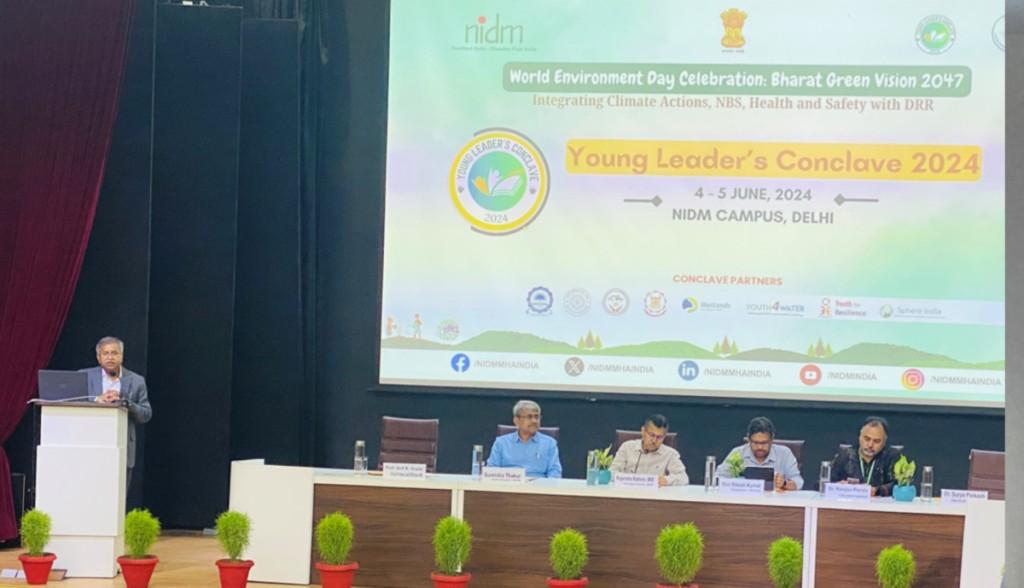New Delhi, India: Resilient AI, a pioneering Tech4Impact startup, is stepping up to tackle this pressing problem through cutting edge, AI powered heat risk solutions, as India grapples with the growing threat of extreme weather events fueled by climate change. Haripriya Kesavan, who is a climate researcher and youth advisor, represented the company and its climate partner STS Global, to demonstrate its innovative approach at the prestigious National Institute of Disaster Management’s Young Leaders Conclave 2024 as a part of World Environment Day Celebration, in Delhi and the annual conference on economics and public policy, ACEP 2024.
In the face of rising temperatures, the cost of inaction is enormous. Healthcare expenses skyrocket due to heat-related illnesses, productivity plummets due to absenteeism, and overall well-being suffers. With 12 cities, including Bengaluru and Guwahati, continuing to experience more than 100 days of temperatures that are higher than normal for the period from 2023 onwards, 15 out of India’s 27 cities have had minimum five days of excessive heat in a single year as per studies conducted by Climate Central. While rising outdoor temperatures garner headlines, Resilience AI is shining a light on the often-overlooked danger of indoor heat.
“Indoor heat poses an invisible threat that can be even more hazardous than outdoor temperatures,” explained Samhita R, Co-Founder at Resilience AI. “The construction traps and radiates heat from everyday activities, such as sunlight or building materials, which creates dangerous situations in disadvantaged communities where there is a lack of access to cool space.”
Resilience AI’s cutting-edge solutions are designed to empower these vulnerable communities by leveraging the power of artificial intelligence (AI). In Delhi’s Vivekananda Camp, a densely populated informal settlement, the company deployed its AI-based ResSolv heat risk model, utilising a multi-pronged strategy:
– Building Footprint Detection: Identifies structures and estimates heat risk.
– Multi-Hazard Risk Scoring: Considers factors like roof type and density.
– Heat Hotspot Mapping: Pinpoints areas with the highest indoor and outdoor heat risk.
Resilient AI allows targeted interventions to be made, targeting households most in need by empowering stakeholders with accurate information. The company has implemented a number of solutions to chill, including the use of solar thermal roofs from scrap material, street lighting with locally produced materials and revitalised Safe Drinking Water stations through cooperation with Vivekananda Camp’s community.
In particular, the efforts of resilience AI have been broadened beyond technical solutions and are fostering a community approach to climate adaptation. Women’s leaders at Vivekananda Camp have used AI climate risk tools and an automatic weather station to develop a techSavvy, Early Warning System that issues alerts at household level enabling residents to take precautionary action.
“The findings were eye-opening,” said Samhita R, Co-Founder at Resilience AI. “In particular, marginalised communities with limited access to cooling facilities are at greater risk of indoor heat than in the outdoors.” Our Community’s early warning system, which is based on artificial intelligence, has proven its potential for saving lives.”
To build a more resilient future, Resilience AI advocates for a two-pronged approach:
1. Policy Interventions: Building codes and permits that take into account technology based heat risk assessments can lead to the development of infrastructure that is resilient to heat, while mandatory physical risk assessments for the financing of climate change construction will encourage the construction of climate resilient buildings.
2. AI Climate Powered Risk Assessment: This innovative tool offers developers insight into heat risk in greenfield and brownfield projects, helping them to build resilience from the ground up while automated early warning systems allow proactive planning of mitigation strategies with a focus on high hazard areas.
“For the unique challenges we face in today’s times, our solutions must be equally unique,” said Samhita R, Co-Founder at Resilience AI. “We can effectively adapt to a rise in heat risk and reduce the costs of inaction by harnessing AI’s power and building resilience for our communities.”

